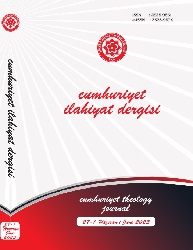Modern Birey İçin Bir Yaşam Rehberi Olarak Ebu Bekir Râzî’nin Ahlak Felsefesi
The Moral Philosophy of Abu Bakr Razi as a Life Guide for the Modern Individual
Author(s): Emel GüvençSubject(s): Ethics / Practical Philosophy, Islam studies, Philosophy of Middle Ages, Existentialism, Philosophy of Mind
Published by: Cumhuriyet Üniversitesi İlahyat Fakültesi
Keywords: Islamic Moral Philosophy; Abu Bakr al-Razi; Spiritual Medicine; Improvement of Moral; Modern Individual;
Summary/Abstract: Abu Bakr Razi, an important Islamic philosopher who produced thoughts on how to protect physical and mental health, expresses in his philosophical treatises on morality that there is a close connection between the psychological well-being and their moral competence of a person. According to him, for a person to be healthy both physically and mentally, it depends on not living in a pleasure-oriented way, keeping his/her emotions and thoughts under rational control, being able to critically examine oneself, and actively struggling with the deficiencies that distance them from a virtuous life. Indeed, if a person allows their desires, passions, and instincts to control their mind instead of keeping them under rational control, they will eventually be unable to prevent the recurrence of spiritual illnesses within themselves. This is where Razi’s thoughts on healing the soul and developing moral character can be functionalized as a kind of moral prescription for achieving a virtuous and happy life. According to Razi, who consistently emphasizes the value of reason in all his thoughts on morality, a person can have a correct understanding of the meaning and purpose of existence by combining the power of reason and the power of will be gifted to him by God and can reach the knowledge of the basic principles of how he should continue his earthly life. This knowledge can help him cope with life’s difficulties, overcome his fears/anxiety regarding his own mortality, and struggle with basic human weaknesses such as selfishness, stinginess, and greed, thereby leading to happiness both in this world and in the existential dimension after death. Although it is thought that the human weaknesses that Razi observed directly or indirectly during his lifetime played a decisive role in the emergence of these thoughts, in fact, it can be thought that the weaknesses in question are weaknesses that have always existed with the worldly existence of man and cannot be confined to a certain time or place. Therefore, it can be said that Razi’s treatises, which he wrote for the improvement of morality and which can be defined as the examination of the soul from an Islamic perspective in a philosophical manner, contain thoughts that can guide today’s modern individuals who seek a remedies in the face of sorrow, questions how to rectify their mistakes, strive to break free from the captivity of their passions, and desire to attain a happy life. Considering fundamental issues such as narcissism, self-indulgence, the alienation of death, dissatisfaction, consumerism, meaninglessness, aimlessness, alienation from existence and one’s peers, loneliness, and the belief that everything can be controlled, which have a significant impact on individuals’ mental and physical health in our time, it appears essential to benefit from Razi’s philosophical views that have transcended ages and shaped under the shadow of sacred values for the happiness of the modern individual. In this regard, this article examines Razi’s thoughts that question how the individuals can be healed both materially and spiritually, and touch upon various themes such as liberation from sorrow, abandoning mistakes, coping with human weaknesses, not marginalizing death, approaching existence from a perspective of surrender, and thus achieving spiritual healing, which can guide modern individuals in their vital struggles. The main purpose of the article is to discuss the potential contributions of approaching the issues shaped by the dominant paradigm of the era in which the modern individuals find themselves from the perspective of Razi’s thoughts on the improvement of morality and the possible benefits it can provide to the individuals. The importance of this study stems from the attempt to analyze Razi’ spirituality-oriented philosophical thoughts in relation to the existential dilemmas of the modern individual who has become estranged from the sacred, drifted away from the notion that existence serves a purpose, and identified happiness with materiality. In the article, it has been concluded that Razi’s philosophical thoughts on morality, which place the Transcendent One at the center of his philosophy and advocate for acting in accordance with the guidance of the mind, are valuable thoughts based on rational ways that can guide the modern individual. It was thought that the guidance in question would be particularly effective in the following matters: (i) Understanding the value of others’ existence and guidance, (ii) coping with anxiety/fear of death (iii), taking protective measures against mental disorders seen as symptoms of modernity, (iv) developing alternative solution proposals for finding the lost spiritual tranquility, (v) liberating oneself from pain and sorrow, which are indispensable aspects of worldly life, (vi) keeping passions and sensual desires under control, and (vii) trusting and surrendering to God in times of desperation.
Journal: Cumhuriyet İlahiyat Dergisi
- Issue Year: 27/2023
- Issue No: 1
- Page Range: 221-233
- Page Count: 13
- Language: Turkish

